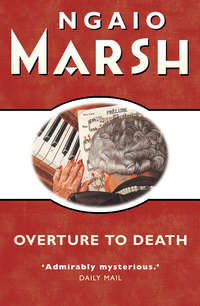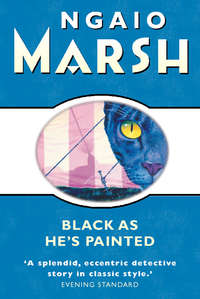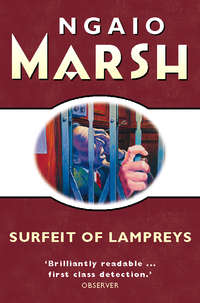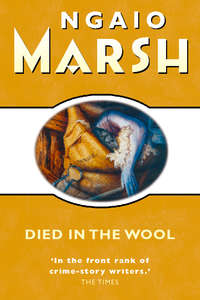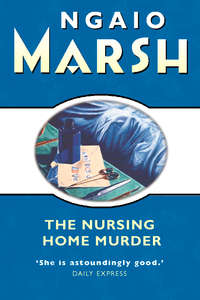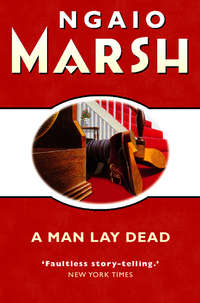
Полная версия
Vintage Murder
‘… very upset … most extraordinary … wish you’d …’ The wind snatched his voice away.
‘I can’t hear you.’
‘It’s Meyer – I can’t make it out. Come over here.’
He led the way across the little bridge and drew his companion into the entrance lobby of the next carriage.
‘It’s Meyer,’ said Hambledon. ‘He says someone tried to murder him.’
CHAPTER 2 Mr Meyer in Jeopardy
The tall man merely stared at Hambledon who came to the conclusion that his astonishing announcement had not been heard.
‘Someone has tried to murder Alfred Meyer,’ he bawled.
‘All right,’ said the tall man. He looked disgusted and faintly alarmed.
‘Carolyn wants you to come along to their sleeper.’
‘You haven’t told her—?’
‘No, no. But I wish you’d let me—’
The inside door of the little lobby burst open, smacking Hambledon in the rear. The pale face of Mr Alfred Meyer appeared round the side.
‘Hailey – do come along. What are you – oh!’ He glanced at the tall man.
‘We are both coming,’ said Hambledon.
They all lurched along the narrow corridor off which the two sleepers opened. They passed the first door and Meyer led them in at the second. The “de luxe” sleeper was a small cabin with two narrow bunks and a wash-basin. Carolyn Dacres, wearing some sort of gorgeous dressing-robe, sat on the bottom bunk. Her arms were clasped round her knees. Her long reddish-brown hair hung in a thick twist over her shoulder.
‘Hullo!’ she said, looking at the tall man. ‘Hailey says he thinks you’d better hear all about it.’
‘I’m sure you’d rather talk over whatever has happened among yourselves. I assure you I’ve no desire to butt in.’
‘Look here,’ said Hambledon, ‘do let me explain – about you, I mean.’
‘Very well,’ said the tall man, looking politely resigned.
‘We all knew him as “Mr Allen” on board,’ began Hambledon. ‘That’s what he was in the passenger list. It was only tonight, in the train, that I realised he was Roderick Alleyn – E Y N – Chief Detective-Inspector, CID, and full musical honours with a salute of two sawn-off shotguns.’
‘My God!’ said Mr Meyer plaintively. It was his stock expression.
‘Why–’ said Carolyn Dacres, ‘why then you’re – yes, of course. “The Handsome Inspector.” Don’t you remember, Pooh? The Gardener case? Our photographs were side by side in the Tatler that week, Mr Alleyn.’
‘The only occasion,’ said Chief Detective-Inspector Alleyn, ‘on which I have felt there was any compensation for newspaper publicity.’
‘Any compensation,’ broke in Mr Meyer. ‘My God! Well now, as you are an expert, will you listen to this? Sit down for God’s sake. Move up, Carol.’
Alleyn sat on a trunk, Hambledon on the floor, and Meyer plumped down beside his wife. His large face was very white and his fat hands shook slightly.
‘I’m all upset,’ he said.
‘I’ll try to explain,’ said Miss Dacres. ‘You see, Hailey darling – and Mr Alleyn – Alfie-Pooh sat up late. He had a lot of correspondence to get through, and he brought his typewriter in here. Some time before we got to the last station he thought he would go out to that shocking little platform for a breath of fresh air. Didn’t you, darling?’
Mr Meyer nodded gloomily.
‘We were at that time travelling up or down a thing that I think they call the corkscrew. The guard, who is an exceedingly nice man, and so, so well informed, told us all about it. It appears that this corkscrew—’
‘Spiral,’ corrected Mr Meyer.
‘Yes, darling. This spiral is quite remarkable as railway lines go. One is continually catching one’s own tail and the guard’s wagon is quite often in front of the engine.’
‘Really, Carolyn!’ expostulated Hambledon.
‘Something of the sort, darling. However, that is of no real importance as far as this story goes. The only thing we must all remember is that when it is corkscrewing the train keeps on turning round and round.’
‘What can you mean?’
‘Cut out the comedy, Carolyn,’ begged Mr Meyer. ‘This is serious.’
‘Darling, of course it is. You see, Mr Alleyn, Alfie went out on the little platform and stood there, and all the time the train kept turning corners very fast and it was all rather impressive. Alfie was very excited and thrilled with the view, although it was so dark he could not see much, except the other parts of the train corkscrewing above and below him. He heard a door bang, but he did not look round because he thought it was just someone going along the train. He was holding on very tight with both hands. Luckily. Because otherwise when this person pushed him he would have—’
‘Here!’ said Mr Meyer firmly. ‘I’ll tell them. I was on the platform facing outwards. I noticed the iron door to the steps was opened back and there was nothing between me and God knows all. It was blowing a gale. I kind of knew people were going past me on their way through the train, but I didn’t look round. We came to one of these hairpin-bends and as we swung round someone kicked me on the behind. Hard. By God, I nearly went over. As nearly as damn it. I tell you I lurched out over the step. I grabbed at the door with my left hand, but I must have pulled it away from the catch on the wall as if I was going through and shutting it after me. See what I mean? I clutched the platform rail with my right hand – just caught it close to the iron stanchion by the steps. It seemed to last a lifetime, that hanging outwards. Then the train swung round the opposite way and I got back. Of course when I was all right again and turned round the man had gone. God, I’m all to pieces. Look in that case there, Hailey. There’s a bottle of brandy.’ He turned pale bulging eyes on Alleyn.
‘What the hell do you make of that?’
‘Extremely unpleasant,’ said Alleyn.
‘Unpleasant! Listen to him, will you!’
‘My poor Alfie,’ said his wife. ‘You shall have quantities of brandy. Pour it out, Hailey. There are glasses there, too. We shall all have brandy while Mr Alleyn tells us who tried to assassinate my poor Pooh. Don’t spill it, Hailey. There! Now, Mr Alleyn?’
She looked up with an air of encouragement at the chief inspector. ‘Is she being deliberately funny?’ Alleyn wondered. ‘She’s not really one of those vague women who sound like fools and are as deep as you make them. Or is she? No, no, she’s making a little “cameo-part” of herself, for us to look at. Perhaps she has done it for so long that she can’t stop.’
‘What I want to know is, what do I do?’ Meyer was saying.
‘Stop the train and tell the guard?’ suggested Carolyn, sipping her brandy. ‘You pull the communication cord and pay five pounds and then some woman comes forward and says you attempted to—’
‘Carolyn, do be quiet,’ begged Hambledon, smiling at her. ‘What do you think, Alleyn?’
‘You are quite sure that you were deliberately kicked?’ asked Alleyn. ‘It wasn’t someone staggering along the train who lost his balance and then his head, when he thought he’d sent you overboard?’
‘I tell you I was kicked. I bet you anything you like I’ve got a black and blue behind.’
‘Darling! We must put you in a cage and take you on tour.’
‘What ought I to do, Alleyn?’
‘My dear Mr Meyer, I – really I don’t quite know. I suppose I ought to tell you to inform the guard, and telegraph the police from the next station. There are some very tight footballers farther along the train. I wonder—’
‘Of course,’ said Carolyn with enthusiasm. ‘How brilliant of you, Mr Alleyn. It was a drunken footballer. I mean, it all fits in so splendidly, doesn’t it? He would know how to kick. Think of the All Blacks.’
Mr Meyer listened solemnly to this. Hambledon suddenly began to laugh. Alleyn hurriedly lit a cigarette.
‘It’s all very well for you to laugh,’ said Mr Meyer. He felt his stern carefully, staring at Alleyn. ‘I don’t know about the police,’ he said. ‘That’d mean the Press, and we’ve never gone in for that sort of publicity. What do you think, Hailey? “Attempted Murder of Well-known Theatrical Manager.” It’s not too good. It isn’t as if it had been Carolyn.’
‘I should think not indeed,’ agreed Hambledon with difficulty.
‘So should I think not indeed,’ said Carolyn.
‘Mr Meyer,’ said Alleyn, ‘have you any enemies in your company?’
‘Good God, no. We’re a happy little family. I treat my people well and they respect me. There’s never been a word.’
‘You say that several people went past you while you were on the platform,’ said Alleyn. ‘Did you notice any of them in particular?’
‘No. I stood with my back to the gangway.’
‘Do you remember,’ asked Alleyn after a pause, ‘if there was anyone standing on the opposite platform, the one at this end of our carriage that was linked to yours by the iron bridge?’
‘I don’t think so. Not when I went out. Someone might have come out later. You know how it is – all dark and noisy and windy. I had my hat pulled down and my scarf up to my eyes. I simply stood with my back half turned to that platform looking out at the side.’
‘How long was it before we got to the last station – Okahune?’
‘I should think about half an hour.’
‘What time was it,’ Alleyn asked Hambledon, ‘when I woke up and we began to talk? I looked at my watch, do you remember?’
‘It was ten past two. Why?’
‘Oh, nothing. We got to Okahune at two-forty-five.’
Hambledon glanced sharply at Alleyn. Carolyn yawned extensively and began to look pathetic.
‘I’m sure you are longing for your beds,’ said Alleyn. ‘Come on, Hambledon.’
He got up and was about to say good night when there was a bang at the door.
‘Mercy!’ said Carolyn. ‘What now? Surely they can’t want to punch more holes in our tickets. Come in!’ Valerie Gaynes burst into the little sleeper. She was dressed in a shiny trousered garment, covered with a brilliant robe, and looked like an advertisement for negligées in an expensive magazine. She made a little rush at Carolyn, waving her hands.
‘I heard you talking and I simply had to come in. Please forgive me, darling Miss Dacres, but something rather awful has happened.’
‘I know,’ said Carolyn promptly, ‘you have been kicked by a drunken footballer.’
Miss Gaynes stared at her.
‘But why—? No. It’s something rather awkward. I’ve – I’ve been robbed.’
‘Robbed? Pooh darling, this is a most extraordinary train. Do you hear what she says?’
‘Isn’t it too frightful? You see, after I had gone to bed—’
‘Valerie,’ interrupted Carolyn. ‘You do know Mr Alleyn, don’t you? It appears he is a famous detective, so he will be able to recover your jewels when he has caught Pooh’s murderer. Really, it is very lucky you decided to come to New Zealand, Mr Alleyn.’
‘I am glad you think so,’ said Alleyn tonelessly. ‘I’d be extremely grateful,’ he added, ‘if you kept my occupation a secret. Life’s not worth living if one’s travelling companions know one is a CID man.’
‘Of course we will. It will be so much easier for you to discover Valerie’s jewels if you’re incog., won’t it?’
‘It’s not jewels, it’s money,’ began Miss Gaynes. ‘It’s quite a lot of money. You see, Daddy gave me some English notes to change when I got to New Zealand because of the exchange, and I kept some of them out for the ship, and gave some of them to the purser, and the night before we landed I got them from the purser and – and – they were all right, and I – I –’
‘Have some brandy?’ invited Carolyn suddenly.
‘Thank you. Daddy will be simply livid about it. You see, I can’t remember when I last noticed I still had them. It’s all terribly confusing. I put them in a leather folder thing in my suitcase when I got them from the purser.’
‘That was a damn’ silly thing to do,’ said Mr Meyer gloomily.
‘I suppose it was, but I’m awful about money. Such a fool. And, you see, this morning, before I shut the suitcase, I felt the folder and it rustled, so I thought, well, that’s all right. And then, just now, I couldn’t sleep in this frightful train, so I thought I’d write a letter, and I got out the folder and it was full of paper.’
‘What sort of paper?’ asked Carolyn, sleepily.
‘Well, that’s what makes me wonder if it’s just a low joke someone’s played on me.’
‘Why?’ asked Alleyn.
‘Oh!’ said Miss Gaynes impatiently, ‘you must be too pure and clean-minded at Scotland Yard.’
Hambledon murmured something to Alleyn who said: ‘Oh, I see.’
‘It was the brand they had in the ship. I noticed that. I call that pretty good, don’t you? I mean, to notice that. Do you think I’d make a sleuthess, Mr Alleyn? No, but really, isn’t it a bore? What ought I to do? Of course I’ve got a letter of credit for Middleton, but after all one doesn’t like being burgled.’
‘Did you look at your folder, or whatever it was, after breakfast this morning?’ asked Meyer suddenly.
‘Er – no. No, I’m sure I didn’t. Why?’
‘How much was in it?’
‘I’m not sure. Let me think. I used four – no, five pounds for tips and then I paid Frankie ten that I lost at—’
She stopped short, and a kind of blankness came into her eyes.
‘Oh, what’s the use, anyway,’ she said. ‘I suppose it was about ninety pounds. It’s gone. And that’s that. I mustn’t keep you up, darling Miss Dacres.’
She made for the door. Alleyn opened it.
‘If you would like to let me see the leather case—’ he said.
‘Too sweet of you, but honestly I’m afraid the money’s gone for good.’
‘Well, I should let him see it,’ said Carolyn, vaguely. ‘He may be able to trace it directly to the murderous footballer.’
‘What murderous footballer?’
‘I’ll tell you in the morning, Valerie. Good night, I’m so sorry about your money, but Mr Alleyn will find it for you as soon as he has time. We’ve all had quite enough excitement for one night. Let us curl up in our horrid little sleepers.’
‘Good night,’ said Miss Gaynes and went out.
Alleyn looked at Carolyn Dacres. She had shut her eyes as soon as Valerie Gaynes had gone. She now opened one of them. It was a large, carefully made-up eye, and it was fixed on Alleyn.
‘Good night, Carol,’ said Hambledon. ‘’Night, Alf. Hope you get some sleep. Not much of the night left for it. Don’t worry too much about your adventure.’
‘Sleep!’ ejaculated Mr Meyer. ‘Worry! We get to Middleton in an hour. Scarcely worth trying. I can’t lie down with any hope of comfort and you’d worry if someone tried to kick you off a train on the top of a mountain.’
‘I expect I should. Coming, Alleyn?’
‘Yes. Good night, Miss Dacres.’
‘Good night,’ said Carolyn in her deepest voice.
‘So long,’ said Mr Meyer bitterly. ‘Sorry you’ve been troubled.’
Hambledon had already gone out into the little corridor, and Alleyn was in the doorway, when Carolyn stopped him.
‘Mr Alleyn!’
He turned back. There she was, still looking at him out of one eye, like some attractive, drowsy, but intelligent bird.
‘Why didn’t Valerie want you to see the leather writing-folder?’ asked Carolyn.
‘I don’t know,’ said Alleyn. ‘Do you?’
‘I can make a damn’ good guess,’ said Carolyn.
CHAPTER 3 Off-stage
The Dacres Company arrived at Middleton in time for breakfast. By ten o’clock the stage staff had taken possession of the Theatre Royal. To an actor on tour all theatres are very much alike. They may vary in size, in temperature, and in degree of comfort, but once the gas-jets are lit in the dressing-rooms, the grease-paints laid out in rows on the shelves, and the clothes hung up in sheets on the walls, all theatres are simply ‘theatre’. The playhouse is the focus-point of the company. As soon as an actor has ‘found a home’, and, if possible, enjoyed a rest, he goes down to the theatre and looks to the tools of his trade. The stage-manager is there with his staff, cursing or praising the mechanical facilities behind the curtain. The familiar flats are trundled in, the working lights are on, the prompter’s table stands down by the footlights and the sheeted stalls wait expectantly in the dark auditorium.
Soon the drone of the run-through-for-words begins. Mechanics peer from the flies and move, rubber-footed, about the stage. The theatre is alive, self-contained and warm with preparation.
The Royal, at Middleton, was a largish playhouse. It seated a thousand, had a full stage and a conservative but adequate system of lighting and of overhead galleries, grid, and ropes. Ted Gascoigne, who was used to the West End, sniffed a little at the old-fashioned lighting. They had brought a special switchboard and the electrician morosely instructed employees of the local power-board in its mysteries.
At ten o’clock Carolyn and her company were all asleep or breakfasting in their hotels. Carolyn, Valerie Gaynes, Liversidge, Mason and Hambledon stayed at the Middleton, the most expensive of these drear establishments. For the rest of the company, the splendour of their lodgings was in exact ratio to the amount of their salaries, from Courtney Broadhead at The Commercial down to Tommy Biggs, the least of the staff, at ‘Mrs Harbottle, Good Beds’.
George Mason, the manager, had not gone to bed. He had shaved, bathed, and changed his clothes, and by ten o’clock, uneasy with chronic dyspepsia, sat in the office at The Royal talking to the ‘advance’, a representative of the Australian firm under whose auspices the company was on tour.
‘It’s going to be big, Mr Mason,’ said the advance. ‘We’re booked out downstairs, and only fifty seats left in the circle. There’s a queue for early-door tickets. I’m very pleased.’
‘Good enough,’ said Mason. ‘Now listen.’
They talked. The telephone rang incessantly. Box-office officials came in, the local manager of the theatre, three slightly self-conscious reporters, and finally Mr Alfred Meyer, carrying a cushion. This he placed on the swivel chair, and then cautiously lowered himself on to it.
‘Well, Alf,’ said Mason.
‘’Morning, George,’ said Mr Meyer.
Mason introduced the Australian advance, who instantly seized Mr Meyer’s hand in a grip of iron and shook it with enthusiasm.
‘I’m very glad to meet you, Mr Meyer.’
‘How do you do?’ said Mr Meyer. ‘Good news for us, I hope?’
The reporters made tentative hovering movements.
‘These gentlemen are from the Press,’ said Mason. ‘They’d like to have a little chat with you, Alf.’
Mr Meyer rolled his eyes round and became professionally cordial.
‘Oh, yes, yes,’ he said, ‘certainly. Come over here, gentlemen, will you?’
The advance hurriedly placed three chairs in a semi-circle close to Meyer, and joined Mason, who had withdrawn tactfully to the far end of the room.
The reporters cleared their throats and handled pads and pencils.
‘Well now, what about it?’ asked Mr Meyer helpfully.
‘Er,’ said the oldest of the reporters, ‘just a few points that would interest our readers, Mr Meyer.’
He spoke in a soft gruff voice with a slight accent. He seemed a very wholesome and innocent young man.
‘Certainly,’ said Mr Meyer. ‘By God, this is a wonderful country of yours…’
The reporters wrote busily the outlines for an article which would presently appear under the headline: ‘Praise for New Zealand: An Enthusiastic Visitor.’
II
Two young men and a woman appeared in the office doorway. They were Australians who had travelled over to join the company for the second piece, and now reported for duty. Mason took them along to the stage-door, pointed out Gascoigne, who was in heated argument with the head mechanist, and left them to make themselves known.
The stock scene was being struck. The fluted columns and gilded walls of all stock scenes fell forward as softly as leaves, and were run off into the dock. An Adam drawing-room, painted by an artist, and in excellent condition, was shoved together like a gigantic house of cards and tightened at the corners. Flack, flack, went the toggles as the stagehands laced them over the wooden cleats.
‘We don’t want those borders,’ said Gascoigne.
‘Kill the borders, Bert,’ said the head mechanist, loudly.
‘Kill the borders,’ repeated a voice up in the flies. The painted strips that masked the overhead jerked out of sight one by one.
‘Now the ceiling cloth.’
Outside in the strange town a clock chimed and struck eleven. Members of the cast began to come in and look for their dressing-rooms. They were called for eleven-thirty. Gascoigne saw the Australians and crossed the stage to speak to them. He began talking about their parts. He manner was pleasant and friendly, and the Australians, who were on the defensive about English importations, started to thaw. Gascoigne told them where they were to dress. He checked himself to shout:
‘You’ll have to clear, Fred; I want the stage in ten minutes.’
‘I’m not ready for you, Mr Gascoigne.’
‘By – you’ll have to be ready. What’s the matter with you?’
He walked back to the stage. From up above came the sound of sawing.
Gascoigne glared upwards.
‘What are you doing up there?’
An indistinguishable mumbling answered him.
Gascoigne turned to the head mechanist.
‘Well, you’ll have to knock off in ten minutes, Fred. I’ve got a show to rehearse with people who haven’t worked for four weeks. And we go up tonight. Tonight! Do you think we can work in a sawmill. What is he doing?’
‘He’s fixing the mast,’ said the head mechanist. ‘It’s got to be done, Mr Gascoigne. This bloody stage isn’t—’
He went off into mechanical details. The second act was staged on board a yacht. The setting was elaborate. The lower end of a mast with ‘practical’ rope ladders had to be fixed. This was all done from overhead. Gascoigne and the head mechanist stared up into the flies.
‘We’ve flied the mast,’ said the mechanist, ‘and it’s too long for this stage, see. Bert’s fixing it. Have you got the weight on, Bert?’
As if in answer, a large black menace flashed between them. There was a nerve-shattering thud, a splintering of wood, and a cloud of dust. At their feet lay a long object rather like an outsize in sash-weights.
Gascoigne and the mechanist instantly flew into the most violent of rages. Their faces were sheet-white and their knees shook. At the tops of their voices they apostrophised the hidden Bert, inviting him to come down and be half killed. Their oaths died away into a shocked silence. Mason had run round from the office, the company had hurried out of the dressing-rooms and were clustered in the entrances. The unfortunate Bert came down from the grid and stood gaping in horror at his handiwork.
‘Gawdstreuth, Mr Gascoigne, I don’t know how it happened. Gawdstreuth, Mr Gascoigne, I’m sorry. Gawdstreuth.’
‘Shut your – face,’ suggested the head mechanist, unprintably. ‘Do you want to go to gaol for manslaughter?’
‘Don’t you know the first – rule about working in the flies? Don’t you know—?’
Mason went back to the office. One by one the company returned to their dressing-rooms.
III
‘And what,’ said the oldest of the three reporters, ‘is your opinion of our railroads, Mr Meyer? How do they compare with those in the Old Country?’
Mr Meyer shifted uncomfortably on his cushion and his hand stole round to his rear.
‘I think they’re marvellous,’ he said.
IV
Hailey Hambledon knocked on Carolyn’s door.
‘Are you ready, Carol? It’s a quarter past.’


